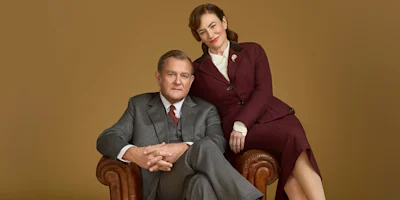
A mighty force in both drama and politics, Glenda Jackson rarely played it safe
The celebrated West End and Broadway actress has passed away aged 87.
Glenda Jackson in some essential way seemed immortal. It wasn’t just that singular voice, which seemed to rise with unbridled majesty from somewhere deep within her tiny frame.
No wonder this much-laureled actress chose King Lear for her return to the stage at the Old Vic in 2016 after several decades in the fiery realm of politics, and on Broadway (in a separate, less accomplished production) three years later. If she was going to revisit the arena that she had helped define ever since she arrived from Liverpool to study at London’s prestigious Royal Academy of Dramatic Art, it was going to be with something at once challenging and unexpected.
But as I think further about the actress who passed away last Thursday at age 87, I’m struck, too, by an indomitability of spirit that felt as if it brooked no opposition. Whereas people in later years often exhibit the withering passage of time, Jackson seemed only to get feistier, braver, bolder, and I count her return to Broadway in 2018 in Edward Albee’s Three Tall Women on my personal list of the ten greatest performances I’ve yet seen.

I first saw Jackson onstage in 1981 in the Broadway transfer of Rose by the Welsh playwright Andrew Davies, a show I recall for pairing Jackson with a legend from a previous generation, the inimitable Jessica Tandy. Jackson got a Tony nomination for the role only to lose that year to a fellow Brit, Jane Lapotaire, who was headlining her own London-to-New York transfer with the play Piaf.
But it wasn’t until I moved to London in the autumn of 1983 that Jackson became an essential part of my playgoing experience. My very first weekend as a London resident, I caught this actress at the Vaudeville Theatre leading Keith Hack’s production of German dramatist Botho Strauss’s 1978 play Great and Small.
Contemporary absurdism – the realm of Strauss’s play – was adventuresome fare for the commercial arena, to put it mildly, as was Jackson’s next partnership with the same director the following year in Eugene O’Neill’s epic Strange Interlude. Her supporting cast in that two-part, nine-act saga first seen in 1928 included a pre-Succession Brian Cox.
The O’Neill revival transferred to Broadway in 1985, allowing Jackson and her English colleagues to remind American audiences of one of their own authorial greats in yet another pioneering choice from a performer who rarely played it safe.
A Tony nomination followed for that show and again in 1988 for her Lady Macbeth opposite Christopher Plummer – a stage assignment I wish I had seen, just as I am forever intrigued by reports of her Martha in Who’s Afraid of Virginia Woolf? in Los Angeles. On that show, she admitted to butting heads with the very author, Edward Albee, whose work would decades later bring her a Tony.

Among Jackson’s London outings, I shan’t ever forget the ferocity with which she presided over the Spanish director Nuria Espert’s blistering 1986 revival of The House of Bernarda Alba, her steeliness a thing of wonder in a play that the National Theatre, in fact, is reviving in a fresh adaptation later this year.
But Jackson could do softness, too – her querulous, sharp-eyed A in Three Tall Women was tough but woundingly tender, and Jackson’s screen renown coupled the sensuality of Women in Love, for which she won her first Oscar, with various Hollywood romcoms (House Calls, Hopscotch and the like), which included a second Oscar for A Touch of Class. (A shame no Oscar could be found for her remarkable work in the astounding Sunday Bloody Sunday, a gay film way ahead of its time.)
I was fortunate to get to talk at length to Jackson twice. First was a pre-show interview during the out-of-town tour of Strange Interlude where the play was trying out in Croydon, its running time so long that sections were excised so audiences would catch their trains home. (“Are you looking for me?” she enquired when we happened to bump into one another in a stairwell at the theatre.)
Late in 1991, we met for coffee in a London hotel for a piece on her shift from acting to the very separate authority and command needed to survive in politics, her accession to MP for Hampstead and Highgate landing her in the very north London borough where, in fact, I still live. And though Jackson could be a sometimes-merciless interviewee, I found her no-nonsense candour refreshing in an age of spin and falsity; she was always entirely, unforgettably herself.
Here was the real deal who had no qualms about famously using a parliamentary tribute to the late Margaret Thatcher to remind colleagues of a legacy that was perhaps not so laudable. Her broadside on that occasion remains a master class in carrying over a rhetorical bravura forged from a life onstage, and one can only wonder about the breakfast table remarks over time between the avid leftist that was Jackson and her journalist son, Dan Hodges, a columnist for Britain’s right-wing Mail on Sunday.
“Thou shouldst not have been old till thou hadst been wise,” Lear famously remarks, and Jackson managed both. It’s often said of people that we won’t see their likes again, and that was especially true of Jackson: the London and Broadway stage are diminished without her, and the world of both politics and performance seems that much duller, too.
Glenda Jackson: 9 May 1936 – 15 June 2023
Photo credit: Brigitte Lacombe, Alastair Muir
Originally published on








